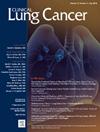血清生物标志物与小细胞肺癌PCI术后神经认知功能下降的关系:NCT01780675 III 期试验的探索性研究
IF 3.3
3区 医学
Q2 ONCOLOGY
引用次数: 0
摘要
收集血样是为了探索与接受预防性颅脑照射(PCI)的小细胞肺癌(SCLC)患者神经认知功能相关的潜在血清生物标记物。这项预先指定的研究包括参加 III 期试验(NCT01780675)的有血样的患者。血液样本在PCI前和PCI启动后3天采集。神经认知能力下降的定义是:从PCI前到PCI后4个月,霍普金斯言语学习测验修订版(HVLT-R)总回忆能力下降≥5分。使用单变量逻辑回归分析筛选生物标志物。< .1 为具有统计学意义。纳入了 48 名在基线时采集了血液样本的入组患者,其中 27 名患者可用于分析,因为另外 21 名患者在 4 个月后未对神经认知功能进行评估。较低水平的 Tie-2(OR = 0.999,90% CI 0.998-1.000,= .062)和较高水平的 MIP-1b(OR = 1.022,90% CI 1.000-1.044,= .093)、CCL-17(OR = 1.004,90% CI 1.001-1.006,= .029)和 PCI 前的 IL-1α(OR=1.597,90% CI 1.077-2.367,= .05)与 4 个月时的神经认知功能下降相关。VEGF-C(OR = 0.972,90% CI 0.949-0.996,= .055)、CCL-17(OR = 0.993,90% CI 0.988-0.999,= .036)、IL-1α(OR = 0.788,90% CI 0.635-0.979, = .071)和 VEGF(OR = 0.981, 90% CI 0.965-0.997, = .051)也与启动 PCI 后 3 天的神经认知功能下降有关。PCI前的生物标志物水平及其启动PCI后3天的水平变化可能与随后4个月的神经认知功能下降有关。如果得到验证,这些生物标志物可用于预测神经认知功能衰退的风险,并作为SCLC患者个性化PCI的辅助决策工具。本文章由计算机程序翻译,如有差异,请以英文原文为准。
Association of Serum Biomarkers With Neurocognitive Decline After PCI in Small Cell Lung Cancer: An Exploratory Study of the Phase III NCT01780675 Trial
Introduction
Blood samples were collected to explore potential serum biomarkers associated with neurocognitive function in small-cell lung cancer (SCLC) patients who received prophylactic cranial irradiation (PCI).
Methods
This pre-specified study included patients with blood samples available, who participated in a phase III trial (NCT01780675). Blood samples were collected before PCI and 3-days post-initiating PCI. Neurocognitive decline was defined as a decrease of ≥ 5 points on total recall in the Hopkins Verbal Learning Test—Revised (HVLT-R) assessed from pre-PCI to 4-months post-PCI. Biomarkers were screened using univariate logistic regression analysis. P < .1 was considered statistically significant.
Results
Forty-eight enrolled patients who had blood samples at baseline were included and 27 were available for analysis as the other 21 did not assess neurocognitive function at 4-months. Lower levels of Tie-2 (OR = 0.999, 90% CI 0.998-1.000, P = .062), and higher levels of MIP-1b (OR = 1.022, 90% CI 1.000-1.044, P = .093), CCL-17 (OR = 1.004, 90% CI 1.001-1.006, P = .029), and IL-1α (OR = 1.597, 90% CI 1.077-2.367, P = .05) before PCI were correlated with neurocognitive decline at 4-months. Decrease of VEGF-C (OR = 0.972, 90% CI 0.949-0.996, P = .055), CCL-17 (OR = 0.993, 90% CI 0.988-0.999, P = .036), IL-1α (OR = 0.788, 90% CI 0.635-0.979, P = .071), and VEGF (OR = 0.981, 90% CI 0.965-0.997, P = .051) 3-days post-initiating PCI were also associated with neurocognitive decline at 4-months.
Conclusions
Biomarker levels before PCI and changes in their levels 3-days post-initiating PCI may be linked to subsequent neurocognitive decline at 4-months. If validated, these biomarkers could be used to predict the risk of neurocognitive decline and act as a decision aid for personalized PCI in SCLC.
求助全文
通过发布文献求助,成功后即可免费获取论文全文。
去求助
来源期刊

Clinical lung cancer
医学-肿瘤学
CiteScore
7.00
自引率
2.80%
发文量
159
审稿时长
24 days
期刊介绍:
Clinical Lung Cancer is a peer-reviewed bimonthly journal that publishes original articles describing various aspects of clinical and translational research of lung cancer. Clinical Lung Cancer is devoted to articles on detection, diagnosis, prevention, and treatment of lung cancer. The main emphasis is on recent scientific developments in all areas related to lung cancer. Specific areas of interest include clinical research and mechanistic approaches; drug sensitivity and resistance; gene and antisense therapy; pathology, markers, and prognostic indicators; chemoprevention strategies; multimodality therapy; and integration of various approaches.
 求助内容:
求助内容: 应助结果提醒方式:
应助结果提醒方式:


